
San Francisco: Bill Maris, founder of Google Ventures, has a purse full of Alphabet Inc.’s cash and a mandate to spend it on big ideas. Having made a name in tech investments, he now wants his firm to be known as a big player in health care and biotech.
Rebranded as GV in December, the venture capital fund has $2.4 billion (Dh8.8 billion) under management and last year about a third of its investments were in health care, Maris said. Compare that with storied Silicon Valley venture firm Andreessen Horowitz, which in November announced a $200 million health fund limited to tech-based approaches.
GV is going further, making bets in sectors overseen by the Food and Drug Administration like drugs and medical devices. Maris says he’s willing to deal with long schedules and regulatory hiccups.
“I care that the technology works,” Maris said. “The rest will follow.”
That wide spectrum of health investments and willingness to take on regulatory risk is unusual. “It’s really hard to find a firm that operates in all these domains,” said Malay Gandhi, former managing director of San Francisco-based digital health venture firm Rock Health. “And they’re not dabbling either. It’s multiple companies per category, with big check sizes.”
GV is also different from many venture firms in that its funding comes entirely from a single entity with massive resources. “I spend no time fund-raising,” Maris said. “Alphabet can give us as much money as we want. They can’t give us time back, so we invest time even more carefully than money.”
Health care became GV’s largest investment category in 2014, topping consumer, data and artificial intelligence, enterprise and robotics. In 2013, only 6 per cent of GV’s investments were in health care. That jumped to 34 per cent in 2014 and 31 per cent in 2015, and Maris may expand his team of five partners who cover the industry this year.
Overseen by the FDA
Many tech-oriented venture-capital firms have zeroed in on health care in recent years, but they have avoided areas that would be overseen by the FDA because it can take more than a decade to get a product through the required preclinical testing and multiple human trials needed for approval. GV invested last year in Editas Medicines Inc., which began trading as a public company on February 3. Its first human trials for its gene-editing technology won’t start until 2017.
Another GV-backed company is Denali Therapeutics Inc., a biotech founded in May to work on treatments for neurodegenerative diseases. Denali hasn’t publicly identified the drug candidates it’s working on, let alone said when it will start trials.
That’s a different approach than some of the tech world’s forays into health. Andreessen Horowitz General Partner Vijay Pande said in a blog post that he doesn’t like traditional biotech because of “risks due to side effects, additional regulatory issues and so on”. The fund plans to stick to digital-only approaches.
When describing his vision for GV and the health care areas he wants to invest in, Maris lists genomics, cancer, central nervous system disorders and ageing, focusing on either technology or therapeutics. Maris’s targets include areas where drugmakers have struggled to find breakthroughs.
Among age-related diseases, for example, there have been more than 100 attempts to develop an Alzheimer’s treatment since 1998, and all have failed. At the same time, any successful treatment would have multibillion-dollar markets.
Spectacular outcomes
“Often, the ones that are most controversial — Uber, Foundation — have the most spectacular outcomes, good or bad,” Maris said. “We are looking for spectacular outcomes. The most you can lose is all of your money.”
The gains can be far larger, he said.
Despite Maris’s confidence, some of GV’s health companies have faced significant challenges. Foundation Medicine Inc., backed by GV since 2011, has been slow to get insurers to cover its genetic profiles of cancer tumours. The FDA stopped 23andMe Inc, a GV company since 2010, from providing health analysis along with its genetic-sequencing service for a year.
While it’s now cleared to give consumers reports on carrier status for some genetic diseases, it’s a limited subset compared to what was previously offered.












